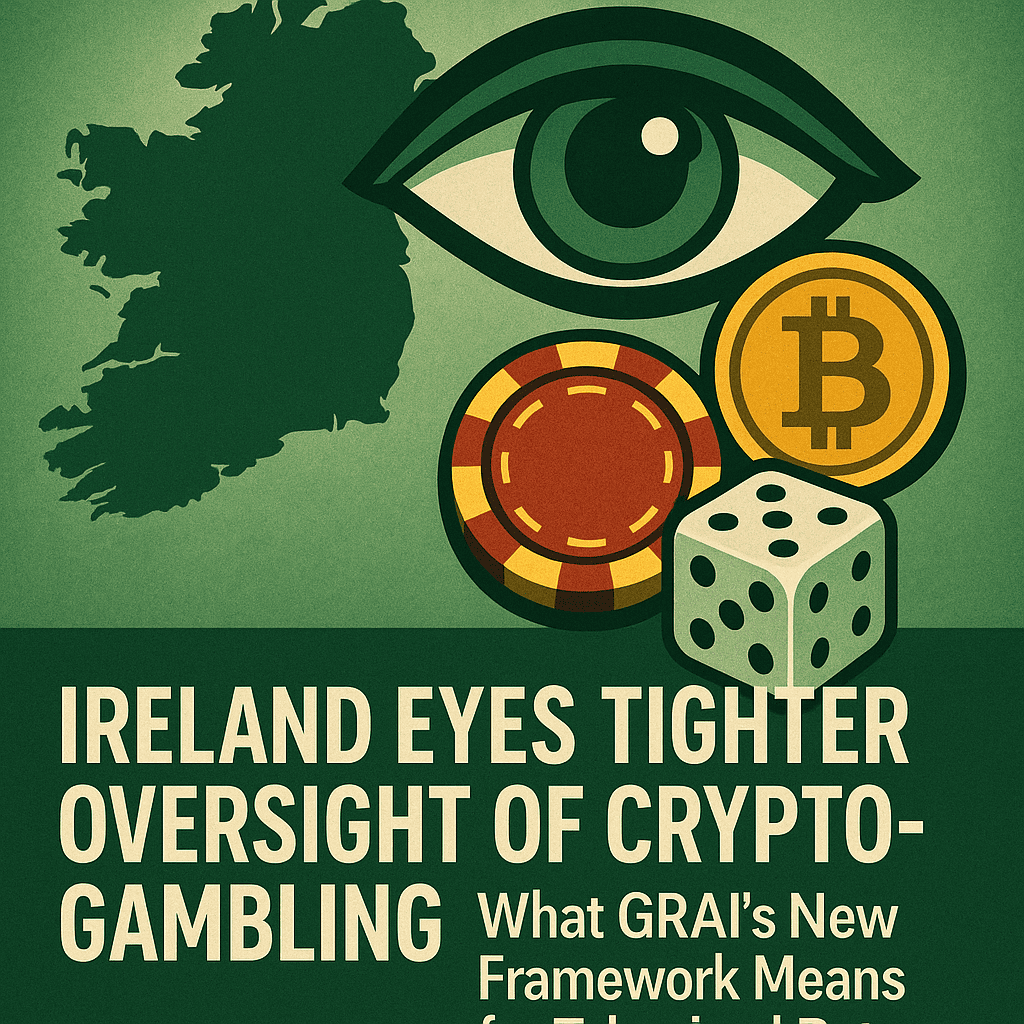This article includes gambling-related content. Irishblogs.ie is committed to providing accurate and responsible information. To ensure the highest standards of quality and safety, all gambling-related content is curated and verified by industry experts from search.casino. Please engage responsibly!

For an industry still catching up with the 2024 Gambling Regulation Act, this represents both an opportunity and a test: can Ireland regulate the future of gambling before it overtakes the present?
From Legislation to Ledger: The Rise of Tokenized Gambling
In 2024, the EU’s Markets in Crypto-Assets Regulation (MiCAR) came into force, setting a baseline for how member states handle digital assets. Ireland’s Central Bank has since confirmed that it will treat certain crypto operators as VASP-licensed entities (Virtual Asset Service Providers), subject to full anti-money-laundering oversight.
Now, with GRAI’s consultation on “innovative gambling services” scheduled for Q4 2025, tokenized casinos and sports-betting platforms could soon fall under a dual compliance regime — supervised jointly by financial regulators and gambling authorities.
It’s the first serious attempt to bring blockchain-based gambling into Ireland’s legal architecture, and it raises a host of questions about consumer protection, taxation, and fair play.
Inside the GRAI Consultation: What’s on the Table
GRAI’s internal discussion papers — seen by operators and industry groups this summer — identify three immediate priorities for crypto-linked gambling:
- Transparency and Traceability
Every transaction involving tokens must be fully traceable, with mandatory KYC (Know-Your-Customer) and KYT (Know-Your-Transaction) checks. GRAI has hinted at requiring blockchain analytics integration similar to what’s used by the Central Bank for crypto compliance. - Proof-of-Reserves Audits
To avoid “phantom liquidity” and ensure player balances are secure, tokenized operators may need to publish audited proof-of-reserves statements verified by independent blockchain auditors. - Player Protection in Hybrid Systems
GRAI’s working papers propose that the same responsible gambling standards applied to fiat casinos must extend to tokenized platforms — including deposit limits, self-exclusion tools, and public-health impact reporting.
While these proposals are still in consultation, they signal a clear direction: crypto-gambling is welcome, but only on transparent and accountable terms.
Industry Reactions: Opportunity Meets Oversight
Feedback from Irish and international operators has been mixed.
Proponents argue that blockchain transparency can enhance trust, offering a verifiable audit trail of bets and payouts — something traditional systems often lack. They also point to Ireland’s potential to become a European hub for compliant crypto-gaming, attracting innovation and investment.
Critics, however, warn that layered oversight — financial and gambling regulation combined — could suffocate smaller startups. The cost of maintaining compliance infrastructure, real-time transaction monitoring, and dual audits could push only the largest operators to remain competitive.
“This framework risks creating an elite market of licensed giants, while the creative early-stage projects that make Web3 exciting may never make it past the paperwork,” said one Dublin-based fintech founder involved in the consultation.
How It Could Change the Player Experience
For Irish players, the transition could bring both reassurance and restriction.
Licensed crypto-casinos would have to disclose wallet structures, clearly mark token volatility risks, and maintain round-the-clock support in line with responsible-gambling standards.
In practical terms:
- Crypto deposits would only be accepted through verified custodial gateways.
- “Anonymous play” would become illegal — each wallet tied to a verified identity.
- Bonuses and token rewards might be reclassified as financial instruments, subject to taxation.
This level of transparency could eliminate scam projects and grey-market platforms, but some fear it may also drive adventurous users toward unregulated offshore sites — an outcome GRAI will have to anticipate and mitigate.
A Balancing Act Between Innovation and Control
The proposed Irish model stands at the crossroads of two worlds: financial regulation and gambling law.
If executed well, it could become a blueprint for other EU jurisdictions — demonstrating how to integrate decentralized technologies into national compliance frameworks. But if mishandled, it risks stifling one of the most innovative corners of the gaming sector before it matures.
Experts at University College Dublin’s Law & Tech Centre note that Ireland’s advantage lies in its scale:
“It’s small enough to experiment with smart regulation, but connected enough to set a European precedent.”
Read also: https://irishblogs.ie/dublin-gambler/feed/fast-payout-casinos
The Road Ahead
GRAI’s final consultation report is expected in early 2026, followed by a pilot licensing phase later that year.
Until then, crypto-gambling operators eyeing the Irish market would be wise to begin compliance readiness — particularly around AML, blockchain auditability, and consumer-protection measures.
Because if one thing is clear from Ireland’s regulatory evolution, it’s this: the era of unverified bets is ending.
Conclusion: The Ledger Is Watching
As Ireland embraces both blockchain technology and responsible gambling reform, the old dichotomy between “freedom” and “control” is giving way to something more nuanced — transparency.
For players, that means safer experiences.
For operators, higher standards.
For Ireland, a chance to lead the conversation about what ethical innovation looks like in the digital casino age.
